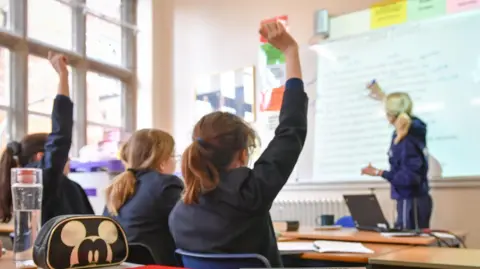Private school tax breaks a 'luxury', says Phillipson
 PA Media
PA MediaTax exemptions on private schools are a "luxury we cannot afford", the education secretary said ahead of a new policy coming into effect.
Bridget Phillipson defended the government ending the exemption from Wednesday.
Writing in the Sunday Telegraph, she said "very few families" would leave the schools as a result. Separately, she told the Sunday Times she had the support of middle-class parents as they had already been "priced out" of private education.
The Conservatives labelled the decision a "vindictive policy that will worsen the education of every single child, regardless of the school they are educated in".
The policy was outlined by the Chancellor Rachel Reeves during the autumn Budget.
The money raised would go towards investing in state schools and teacher recruitment, Phillipson wrote in the Telegraph. She added that £1.8bn would be raised a year by 2029-30.
But the Independent Schools Council (ISC), which represents most of the UK's private schools, said the money the government claimed it would raise was an "estimate, not a fact".
"The negative effects of this unprecedented tax on education will be felt by families and children across state and independent schools," the ISC's chief executive, Julie Robinson said on Sunday.
Ms Robinson added that they are not alone in predicting that the policy "could cost the treasury money and would damage state education" due to the cost of educating more children in the sector.
Approximately 93% of children in the UK currently attend state schools, Phillipson said.
The government has pledged to recruit 6,500 more teachers funded by the money raised in the policy, Phillipson said.
She added that "high-quality" teaching has the biggest impact on children's learning, but that "in some key subjects the teacher pipeline has been running dry".
Schools have been struggling to hire teachers in maths, science, and design and technology, she said.
Phillipson added that "very few" families would move out of private schools, according to the government's impact assessment.
In October however, the ISC said some private schools reported a 4.6% drop in pupil attendance in secondary school uptake, which it attributed to parents now deciding against sending their children to private school.
Acknowledging the policy as an area "where feelings run high", Phillipson said that some of the conversations around it have been "scaremongering".
She also told the Sunday Times that she had received abuse over the policy, but would wear it as a "badge of honour" if it meant driving up the standards of state schools.
She added that the policy was supported by "middle-class parents in good professional jobs with housing costs [who] just can't afford that level of fee" and want "brilliant state schools".
Emphasising the importance of investment into state schools in her Telegraph piece, Phillipson said raising the standards of such establishments was the "route to better life chances… and a stronger society and economy".
A Conservative spokesperson added: "The idea that middle-class parents support this bitter policy is simply not true.
"Labour's decision to tax education will mean thousands of hardworking parents will no longer be able to afford to send their children, including those with SEND [special educational needs and disabilities], to private school."
